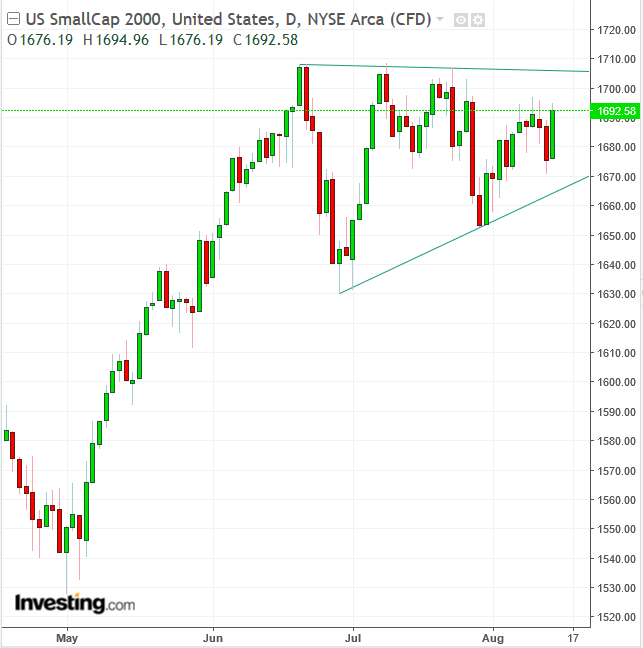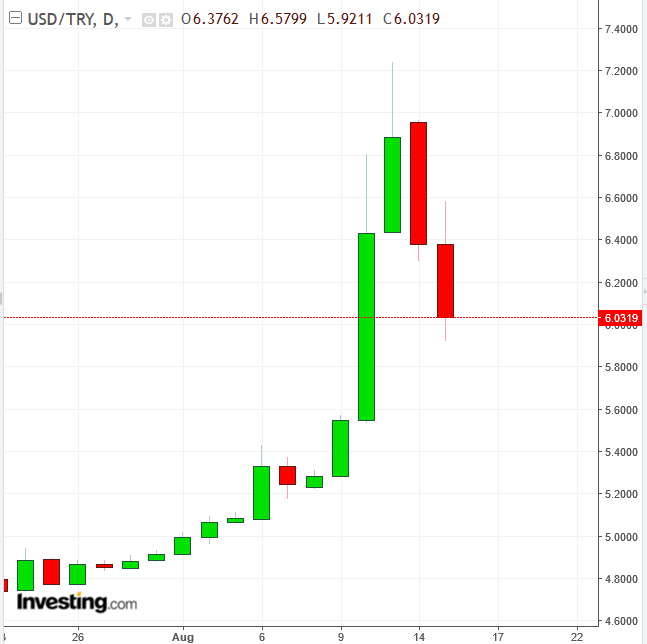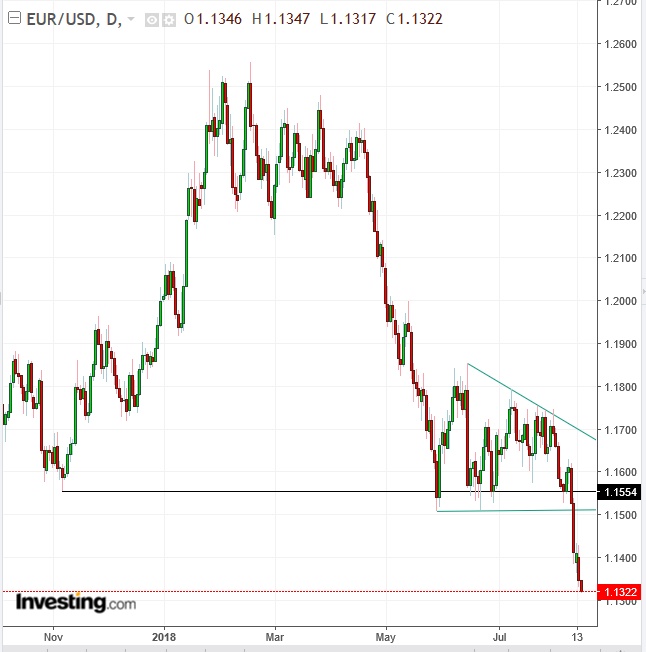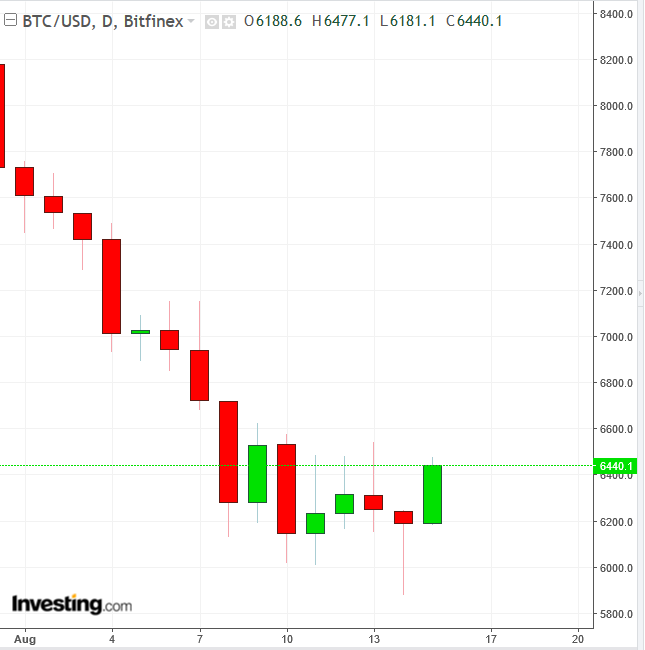-
Global stocks, US futures resume selling on renewed Turkish contagion fears
-
USD, Treasurys benefit from investors' flight to safety
-
Oil slides on surprise US inventories buildup
-
Cisco (NASDAQ:CSCO), due after today's market close: $0.63 EPS forecast, VS $0.55 percent for last year’s same quarter.
-
Walmart (NYSE:WMT), due tomorrow before market open, $1.21 EPS forecast VS $1.08 for the same quarter a year earlier.
-
Brexit talks between the EU and the UK resume in Brussels on Thursday.
-
Retail sales data in the US comes out on Wednesday, followed by housing data on Thursday.
-
The MSCI All-Country World Index slipped 0.2 percent.
-
The MSCI Emerging Market Index fell 0.9 percent, reaching the lowest level in 13 months on its sixth straight decline.
-
The Japanese yen gave up 0.1 percent to 111.25 per dollar, the weakest level in more than a week.
-
South Africa’s rand slid 0.1 percent to 14.2588 per dollar.
-
The MSCI Emerging Markets Currency Index edged 0.1 percent lower.
-
The Bloomberg Commodity Index edged 0.5 percent lower to the lowest level in almost four weeks.
-
West Texas Intermediate crude declined 0.6 percent to $66.64 a barrel, the lowest level in almost eight weeks.
-
LME copper fell 1.6 percent to $5,948.00 per metric ton, the lowest level in 13 months.
-
Gold dropped 0.4 percent to $1,189.05 an ounce, the weakest level in almost 19 months.
Key Events
European shares and futures on the S&P 500, Dow and NASDAQ 100 suffered the same downward pressure that battered most Asian equities on Wednesday, as the Turkish meltdown continued to test investor nerves.
The pan-European STOXX 600 slid into negative territory by late morning session, after gains in travel and media firms had helped it crawl higher. The index was weighed on by mining stocks, which were in turn dragged lower by copper’s fall to the lowest level in over a year, as commodity markets took a beating from the spillover of Turkish risk.
Earlier, during Asian trade, China’s Shanghai Composite tumbled 2.08 percent, underperforming its regional peers. Hong Kong’s Hang Seng dropped 1.55 percent while Japan’s Nikkei 225 slipped 0.68 percent. Conversely, South Korea’s KOSPI and Australia’s S&P/ASX 200’s both gained 0.47.
Global Financial Affairs
In yesterday's North American session, US equities managed to put the breaks on their longest slide since March. Tapestry (NYSE:TPR), the handbag maker formerly known as Coach, was the top performer of the S&P 500 after its quarterly results showed that shoppers are returning to its Kate Spade brand.
On the other side of the spectrum, Tesla (NASDAQ:TSLA) lost 2.5 percent as reports that Goldman Sachs had been hired to help the company withdraw from the public market were refuted.
Overall, the SPX edged 0.64 percent higher, halting its 1.25 percent three-day selloff. All sectors closed in positive territory, with Consumer Discretionary growth stocks outperforming (+0.97 percent). Financials also offered a buying opportunity (+0.90 percent), as easing concerns over a Turkish contagion allowed dip buyers to take advantage of Monday's bank shares selloff.
Materials (+0.83 percent) fared as the third best-performing sector, as steadier sentiment helped soothe trade worries as well. Defensive sector Utilities (+0.24 percent) underperformed as traders raced to increase their risk exposure, while Energy stocks (+0.23 percent) also lagged behind, tracking a surprise increase in US oil inventories.
Meanwhile, the Dow Jones Industrial Average inched 0.45 percent higher and the NASDAQ Composite climbed 0.65 percent.

The Russell 2000 outperformed, gaining 1.03 percent. The same tailwinds that are boosting investor appetite for the dollar as a safe haven are also favoring small-cap stocks for their minimal exposure to trade jitters. Technically, the index price is forming an ascending channel, as demand outpaces supply.
Despite thin summer trading and investors remaining cautious, the US equity bull market is just one week away from becoming the longest in history, though trade tensions between the US and China continue to linger.

On the Turkish crisis front, the country announced today that it will impose an additional tax on imports of a broad range of American goods, signaling its spat with the US is far from over.
The Turkish lira added 5.3 percent to its two-day rebound, which reached 12.35 percent in the Asian session. However, the EM currency is still 22.5 percent down for August. While yesterday’s bounce-back eased investor concerns over a possible contagion effect, today’s gains fell short of quelling renewed fears.
At the same time, other emerging market currencies continued their slide lower.

The euro hit its lowest levels since mid-2016, after it completed a descending channel and slipped below the November 2017 support.
Conversely, the Dollar Index extended a climb to a 14-month high. While the greenback benefited from higher risk appetite on Tuesday, it gained from today's search by investors for security, confirming its dual success as both a safe haven and a growth asset.
Investors also rotated into bonds, pushing the yield on 10-year Treasurys back below the 2.9 percent mark.
Oil ticked lower as focus returned to near-term supply risks, as cushing oil stocks rose for the first time since March. The commodity was pressured by the USD rally.

Bitcoin rebounded from yesterday’s selloff, after a bullish pushback before the close, forming an exceptionally solid hammer.
Up Ahead
Earnings reports due this week include:
Market Moves
Stocks
Currencies
Bonds
Commodities
